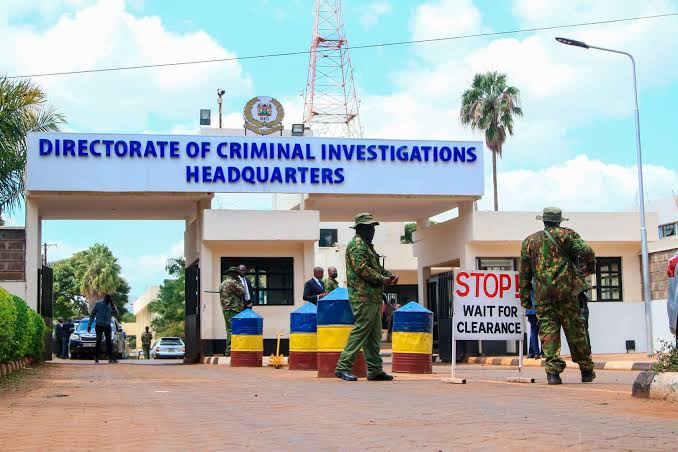Investigations
DCI Closes in on Masterminds of Lang’ata Women’s Prison Land Heist
The investigation has hit significant roadblocks, with crucial documents mysteriously missing from the Ministry of Lands and Physical Planning.

Powerful individuals and 23 companies in investigators’ crosshairs over illegal allocation of 34-acre parcel originally meant for prison expansion
The Directorate of Criminal Investigations has launched a full-scale probe into what is emerging as one of Nairobi’s most audacious land grabs—the illegal allocation and sale of 34 acres of Ngong Forest land that was earmarked for the expansion of Lang’ata Women’s Prison.
In a dramatic revelation before the National Assembly’s Committee on Implementation, DCI Deputy Director George Kisaka disclosed that investigators have identified powerful suspects and 23 companies that orchestrated the brazen theft of public land, turning it into lucrative residential estates worth billions of shillings.
The land, which was never degazetted according to law, now hosts KMA Estate, Lang’ata Gardens Estate, Lang’ata View Estate, Shalom Estate, St Mary’s Hospital, and Forest Edge/View Estates—all built on illegally acquired forest land.
Kisaka told lawmakers that preliminary investigations have exposed a sophisticated web of deceit spanning three decades, involving former government officials who abused their positions to allocate protected forest land to private entities.
The agency is now racing against time to trace former Commissioners of Lands, Chief Conservators of Forests, and Commissioners of Prisons who served between 1985 and 1998.
“What remains is to trace and record statements from former Commissioners of Lands, Chief Conservator of Forests, Commissioners of Prisons, and other persons or companies of interest,” Kisaka revealed, promising a final report within two months.
The investigation has hit significant roadblocks, with crucial documents mysteriously missing from the Ministry of Lands and Physical Planning.
The National Treasury has also washed its hands of the matter, confirming in a July letter that it does not have custody of title documents relating to the disputed parcels.
According to investigators, the 34-acre parcel was originally set aside for expanding Lang’ata Women’s Prison but was instead illegally allocated to three entities: Arladyks Investment Limited, Prescot Company Limited, and an individual identified as Onesmus Kimani Ngunjiri.
These initial beneficiaries then subdivided the land, selling parcels to unsuspecting buyers who built homes and commercial properties, complicating any potential recovery efforts.
The Chief Conservator of Forests confirmed that the allocations violated Section 4 of the repealed Forest Act, Cap 385 of 1942, which governed degazettement procedures.
A title grant issued in 1996 to the Permanent Secretary, Treasury, covered 988.82 hectares of Ngong Forest, but subsequent irregular dealings saw chunks of this protected land disappearing into private hands.
The DCI probe is part of a larger investigation into 53.68 hectares of Ngong Forest where Sunvalley I, II, and III Estates, as well as Royal Park Estate, stand today.
Combined with the 34-acre parcel, nearly 88 acres of protected forest have been stolen and converted into prime real estate.
Parliament has already blocked government plans to demolish homes built on the grabbed land, acknowledging that many current occupants may have acquired their properties in good faith.
Instead, the Environment Committee recommended that the government regularise excisions for land already occupied by both public and private institutions.
But Budalang’i MP Raphael Wanjala, who chairs the Committee on Implementation, is demanding accountability.
The committee is following up on recommendations from the Environment and Natural Resources Committee, which directed the DCI to charge all individuals behind the irregular excisions.
The investigation has exposed glaring institutional failures.
How did protected forest land get allocated without proper degazettement? Where were the safeguards when title deeds were being issued? And why have crucial land records conveniently disappeared?
Kisaka has pleaded with the State Department for Lands to expedite retrieval of documents related to the disputed excisions, suggesting that some officials may be sitting on evidence that could crack the case wide open.
The DCI has promised to conclude investigations, record statements from the 23 companies and numerous individuals, and initiate arrests and prosecutions within two months.
But given the power and influence of those likely involved, Kenyans will be watching closely to see if justice will finally be served or if this becomes another case of impunity shielding the well-connected.
The Ngong Forest land saga is a stark reminder of how Kenya’s environmental heritage and public resources have been plundered by those entrusted to protect them.
As investigators close in on the suspects, the question remains: will those who turned prison expansion land into personal fortunes finally face the law?
Kenya Insights allows guest blogging, if you want to be published on Kenya’s most authoritative and accurate blog, have an expose, news TIPS, story angles, human interest stories, drop us an email on [email protected] or via Telegram
-

 Grapevine2 weeks ago
Grapevine2 weeks agoRussian Man’s Secret Sex Recordings Ignite Fury as Questions Mount Over Consent and Easy Pick-Ups in Nairobi
-

 News7 days ago
News7 days agoTHE FIRM IN THE DOCK: How Kaplan and Stratton Became the Most Scrutinised Law Firm in Kenya
-

 Investigations1 week ago
Investigations1 week agoMulti-Million Dollar Fraud: Three Kenyans Face US Extradition in Massive Cybercrime Conspiracy
-

 Economy1 week ago
Economy1 week agoIran Demands Arrest, Prosecution Of Kenya’s Cup of Joe Director Director Over Sh2.6 Billion Tea Fraud
-

 Business1 week ago
Business1 week agoA Farm in Kenya’s Rift Valley Ignites a National Reckoning With Israeli Investment
-

 Africa1 week ago
Africa1 week agoFBI Investigates Congresswoman Ilhan Omar’s Husband’s Sh3.8 Billion Businesses in Kenya, Somalia and Dubai
-

 Grapevine3 days ago
Grapevine3 days agoA UN Director Based in Nairobi Was Deep in an Intimate Friendship With Epstein — He Even Sent Her a Sex Toy
-

 Politics2 weeks ago
Politics2 weeks agoSifuna, Babu Owino Are Uhuru’s Project, Orengo Is Opportunist, Inconsequential in Kenyan Politics, Miguna Says
















